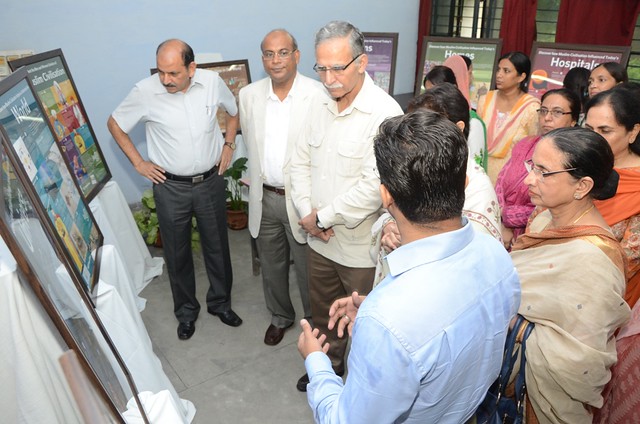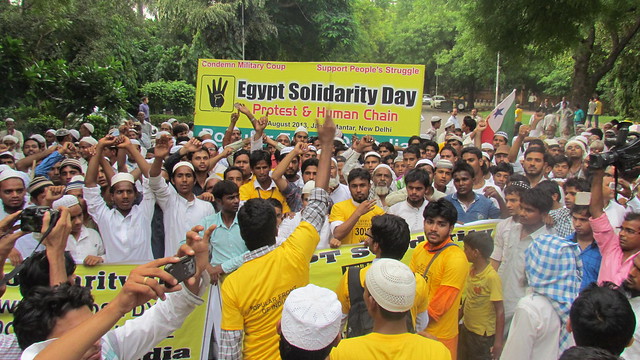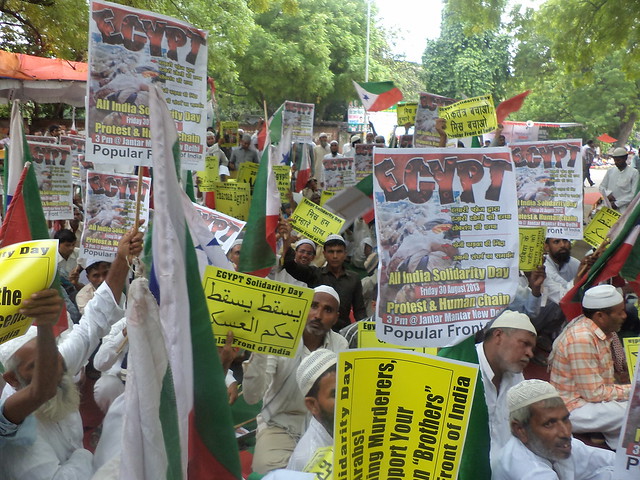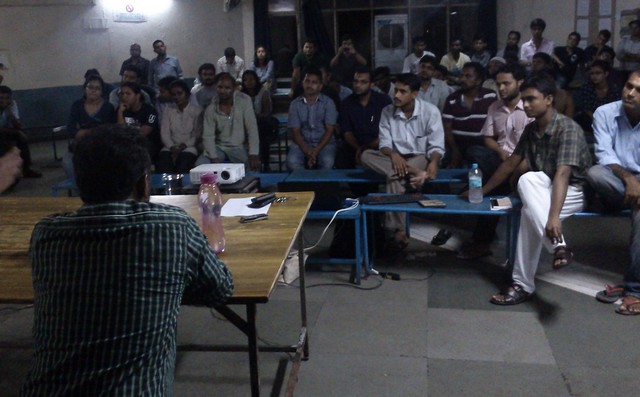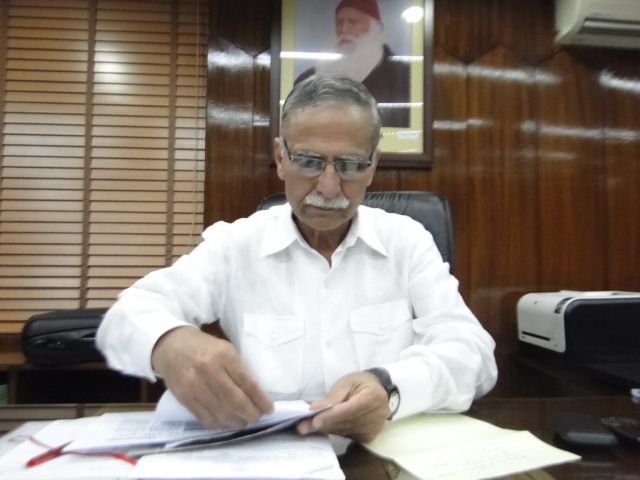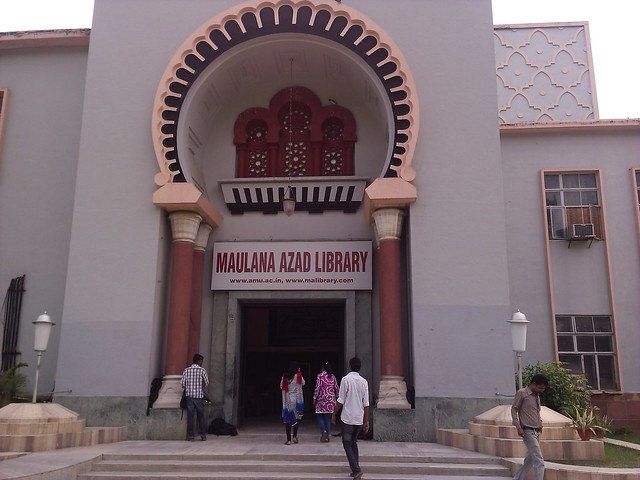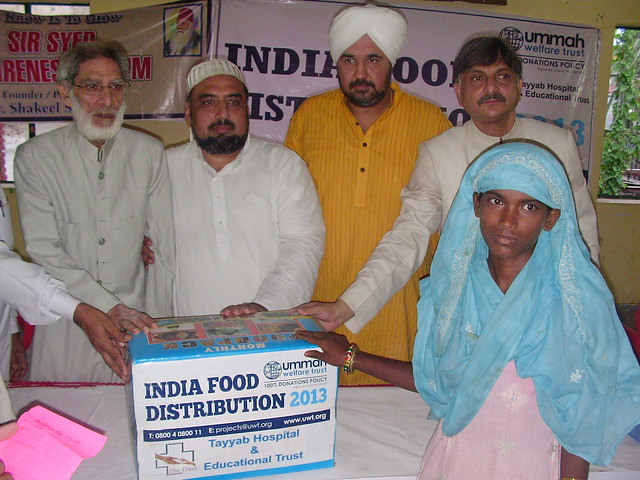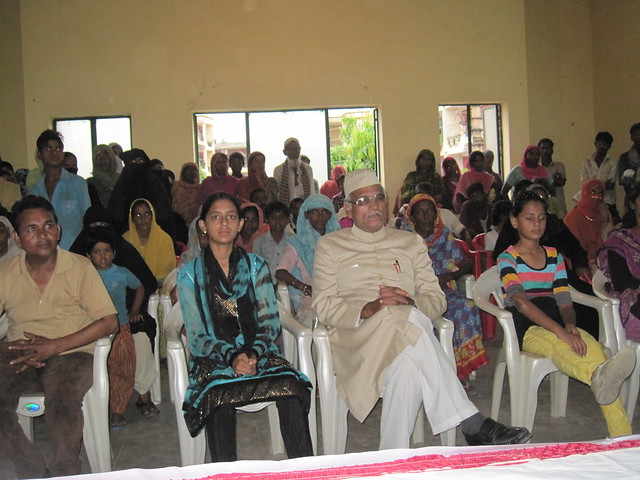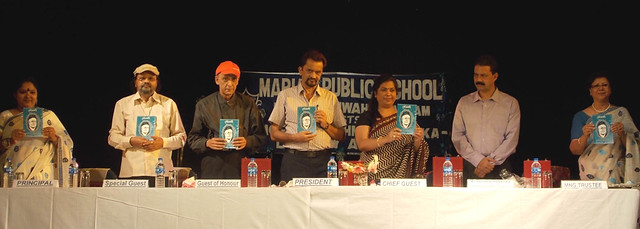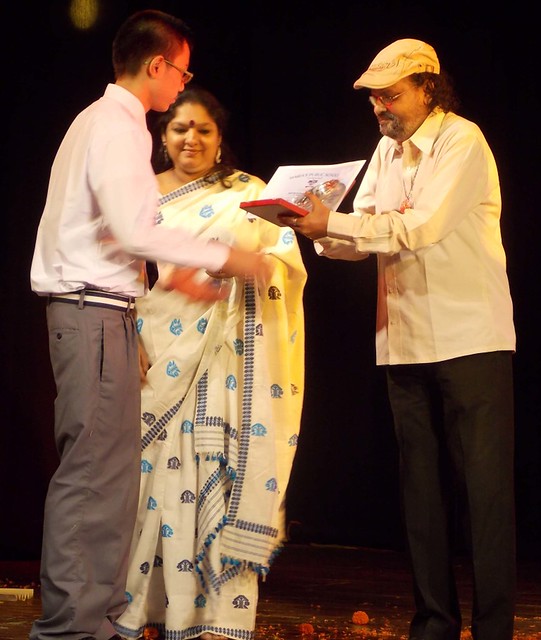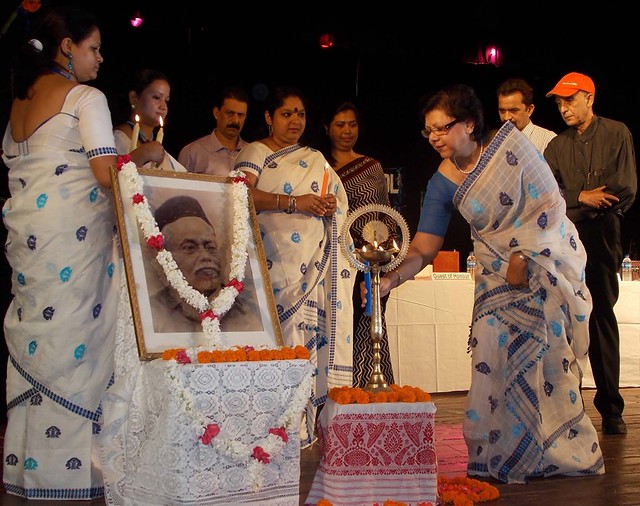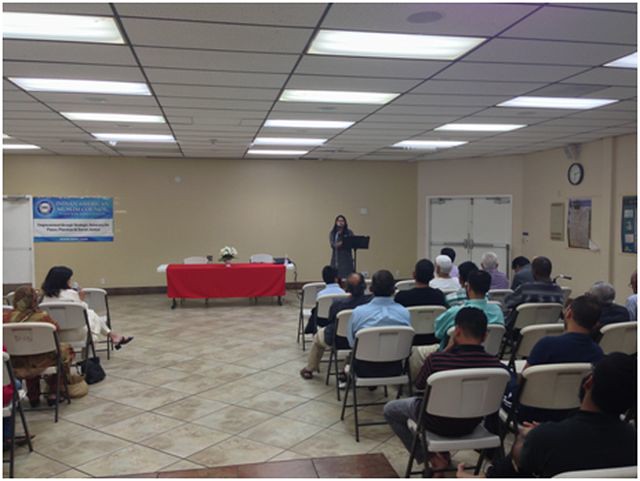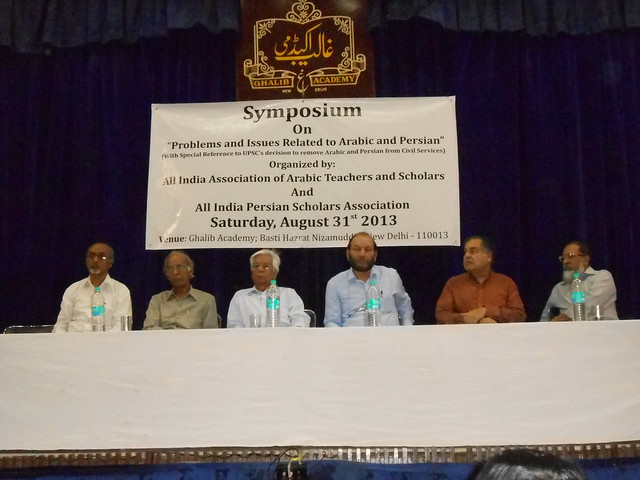By M Reyaz, TwoCircles.net,
Aligarh: Since he took charge as the Vice Chancellor of the Aligarh Muslim University, Lieutenant General Zameerud-din Shah has often been in news for the wrong reason. As he completed 15 months in office, M Reyaz caught with AMU VC. Lt. Gen. Shah was forthright and spoke about his achievements, his vision and his shortcomings.
On his plans to make AMU number one University in India, Lt. Gen. Shah said that he has succeeded partially and is hopeful that in about three and half years time, he would be able to achieve his aim of becoming the number one university in India. He said that his first and foremost plan is to improve the living conditions and general surrounding of the University as, according to him, a person who stays in the slums, behaves like a slum dweller. He said that in last 15 months he focused on law and order situations and in the next session his main aim is on improving the academic eenviornment and over all research output in the University.
On the question of Students’ Union election, however, he refrained from giving any direct answer, but assured that he will endeavour for adequate students’ representations in all facets of the University life. He said, “I am a firm believer in democratic traditions, but it will all depend on the situation in the University and when I am convinced that the Students’ Union will follow their Charter of duties and not misbehave and not try and run the University.”
Brushing aside the controversies surrounding the appointment of retired defence or civil servants as VC, Lt. Gen. Shah catarogically said, “The community elected me, because they wanted a change and InshaAllah I will bring about that change for the betterment of our students and to make sure that the Aligarh Muslim University becomes a brand name once again which it was in the academic field.”
He also justified the appointment of General Dwivedi in the Department of West Asian Studies saying that he has a doctorate in West Asian studies and is also a expert in Chinese language. He said, “...get me a better qualified man, and I will hire him. But I found general Dwivedi to be best qualified for pushing through our agenda of forming this Faculty (of International Affairs) as soon as possible and also because of the fact that he has an Interpreter's certificate in the Chinese language...”
Full Interview:
TCN: At the time of joining, you have said that you wish to work towards regaining the lost glory of AMU and to make it the number one university in the country. How far you feel you have succeeded in your vision and plans?
Gen Shah: We have succeeded partially. As I said that my initial task was to reestablish the rule of law and order in the University. I think we have succeeded in that. We have had unhindered academic activities for the last 15 months.
We have done well on the academic and on the placement front. The main problem, of course, if the living condition of the students. I am very very concerned because unless we improve that, nothing else can improve because a person who stays in the slums, behaves like a slum dweller. So we have got the grant of 100 crores and a special grant of 50 crores. InshaAllah we will be able to build hostels for girls and boys, space out the children.
This year, what I intend doing is concentrating all my energies on improving the academic activities, research, revision of syllabi. These are the few things that we are concentrating on, only academics this years. So I think inshaAllah by (end of my term)... in about three and half years time, we should achieve our aim of becoming the number one university in India.
TCN: I agree the situation has considerably improved. It’s a good point you have raised about the academics. When I talk to, particularly research scholars and teachers in the campus, one thing they often point out is the kind of bureaucratic hurdle they face in terms of getting projects, or when they want to go on sabbatical for further research or post-doctorate, or some kind of fellowship because according to the new UGC guidelines they see it as hindrance in their promotions...Have you tried to or do you intend to do something on that front?
Gen Shah: Yes, yes. We will try and improve upon the research work being done, we are trying to improve the exposure of our teachers and staffs to modern universities across the world, specially UK and USA, because I feel that academic activities will improve on that.
And we are also starting, or restarting the concept of summer school where we will have distinguished professors from USA (and other places) coming in and giving specific lectures on specific subjects. So lot activities, academic activities are planned, and we do hope that the output of our students will improve.
TCN: Will professors from AMU will also be send abroad or only ...
Gen Shah: Yes, it will professors and students in the teachers-students exchange programme, both.
![]()
AMU VC Lieutenant General Zameerud-din Shah.
TCN: You said you focus this year will be on academics and academic research, but I am given to believe that there almost 400 vacant positions in the University across all the departments and centers. Yet there has been very few selection committees even since you have taken charge. Recently President of India, honourable Pranab Mukharjee had also said that these vacant positions in all central universities need to be filled soon. So how do you intend to enhance the whole process?
Gen Shah: Well let me tell you that we have finished the general selection committee of almost one-third of the departments in the University, and so its not that we have not bothered about it. What had delayed the whole process is the confusion in the calculation of the API score, that matter has been resolved; and InshaAllah from next month onward there will be regular general selection committees and I hope that we will make up the short-fall of the teachers within a year or two.
TCN: In this connection only, there are departments of Urdu and History and so many such other departments, which have been pride of AMU. But take for example (department of) Urdu, there are out of 22 vacant seats out of 40, as far as I know. So these (short falls) are not only, in a way, hindering the development or Urdu and Urdu literature, but also over all academic environment...
Gen Shah: I entirely agree with you. Actually I am not in favour of this system of ‘gues faculties,’ we want to fill up the vacant seats in all the departments. It has taken me little longer than, what I thought it would. But I am at it, and I entirely agree with you that the deficiencies must be made up at the earliest. People must get their promotions on time. The deficiencies will be filled up, that will be my aim.
TCN: In your Independence Day speech you mentioned about (33 crore) grant being cut by the UGC and you also said that you will raise this issue to the highest level in the government. Have you raised this issue so far or do you intend to...
Gen Shah: Yes I have raised the issue. I have written to the HRD Minister, saying that there is no reason for the grant of Rs 33 crore being cut. What the MHRD is justifying is that this amount was an extra amount given in the 11th Plan for repairs, and special repairs and other things. So my argument is that this was part of the 11th Plan and it should not affect the 12th Plan. I have raised this issue in a letter to the MHRD and I will be meeting him shortly; and I am certain that he will concede to our point of view.
TCN: Continuing with the academics, but now on the new courses and new departments being set up. Recently you had announced that the International Studies center is being established. Could you elaborate more on the process?
Gen Shah: Faculty of International Affairs will really comprise of the Strategic Studies, disaster management, foreign languages; these are the major things. Basically we want our students to get avenues for further employment, there is huge demand for people who are trained in international affairs, and of course we want exposure of our students to foreign languages, Chinese, Spanish, French, Hebrew. These are all (aimed at) enhancing the employment opportunities of our students and we will give a lot of stress on this.
TCN: Hebrew is an interesting subject you have raised the issue about, because starting Hebrew course would mean some kind of MoUs being signed with some universities in Israel; how do you intend to do that because that may have some kind of negative repercussion in AMU?
Gen Shah: I agree, but this was a demand from the Academic community. I had not included Hebrew earlier, I quite recognize (the challenges). But it was pointed out in the Academic Council meeting, that we should also study Hebrew and I acceded to that point.
And it is not necessary that we have to have somebody from Israel, who will teach us Hebrew. We will see if there are other avenues opened.
TCN: In May, you had spoke about the center of Strategic Studies and you had said that the center would be named after Tipu Sultan. Is there any progress on that front?
Gen Shah: Once we inaugurate it, I stand by my commitment that it will be named after Tipu Sultan.
TCN: Is there some time frame, by when do you expect it to start?
Gen Shah: The proposal has gone to the Ministry of Human Resources, but you know in this bureaucratic world everything takes little time, but certainly be December we should hope to have everything in position.
![]()
TCN: There are lot many students, not only in AMU but also in Jamia, who come from, who pass out from madrassa and then go on to join universities like AMU, Jamia, or some other universities. Recently you started this ‘bridge’ course for madrassa students. I feel though that the (number of) seats are too low, as hundreds of students from madrassa come out, and there are only 50 seats in (this bridge course). Is there any plan to further increase the seat or to make it more diverse?
Gen Shah: See when you start anything new, you have to start small. You know that in the Aligarh Muslim Universities, the facilities are only for seven to eight thousand students, and we have 28000 students. So we are bursting at the seams. So I really can’t absorb more than 50 for the time being. But let me tell you that I realize that the madrassas are the largest educational network in the country and we must modernize them. And this is the way forward, if madrassa students find avenues for academics, scientific, mdoern scientific education, I am sure that they would be ready to come. There has been massive response to the advertisement for this bridge course. We plan to start with 50, we plan to start small, let us get some experience (before expanding) because we would have run into big problems, where do we accommodate these madrassa students, how do we deal with them. That is why we starting small, and we will see which way it goes and then gradually increase the seat (if need be).
TCN: Across the country, particularly in north India, there are lots of vacant seats for Urdu teachers; and one reason government often gives is that there not enough trained teachers available. Jamia has recently started a center to develop Urdu teachers. I personally feel that the AMU has some kind of responsibility towards Urdu and development of Urdu. Do you have some plans in this connection?
Gen Shah: Well, I agree...certainly. Urdu is an Indian language that originated in the Indo-Gangetic plains and it unnecessarily got a religious tag to it. Actually its very much a language of India and it is the mother tongue of most Muslims in India and we want to preserve and encourage its use. That is why we are giving absolute importance to Urdu.
Earlier Urdu was compulsory languages in the AMU, so was Hindi, so was English. But the marks of Urdu and Hindi were not counted (From this years marks will counted). Most of the students, of course, are studying Urdu because they are from Hindi medium schools. So anybody who studied Urdu in schools has to take Hindi in AMU. So that is one of our ways of encouraging the study of Urdu and we hope that we increase the job prospects of Urdu speaking students.
TCN: From academics, I would now shift to more of management and the new centres and the new centres which the AMU is starting. Government props es to develop these new centers as full fledged universities, and I am given to believe that you have agreed to it in some form. But there are resistances from the larger AMU community on the ground that these centres have not developed so much to stand on its own, and hence if handed over to the government, and if government changes next year, which is more likely to happen, then it may lose its minority character. Would you want to elaborate on that, particularly on your position?
Gen Shah: See, our position is that we will do anything for the educational enhancement of Muslims in particular. This is a secular University, but it was primarily for the millat. Our stand on the conversions of these centres is that in case, as has been assured to us by the Ministry of Minority Affairs, that if these centres are converted into universities the minority character will be taken care of. So if that is taken care of, I have no problems in these centres become full fledged universities.
As you see that these centres have not yet been given due share of funds, but when they become universities, I am sure that Maulana Azad Foundation, under whom the universities will function, they will be able to get larger grants and I think that will benefit education in general to a great degree, specially in minority dominated pockets.
TCN: Mamallapuram and Murshidabad centres had begun before you joined. Kishanganj centre is more likely to begin under your tenure, if everything goes according to the plan. So could you elaborate more on your plans and your vision for the Kishanganj centre?
Gen Shah: In Kishanganj centre, we are straightaway going start a course in B.Ed. this year. It may start a little late, by October or November. Central Government is very keen to have the inauguration of the centre and we are working towards it, and I think, we should very soon be able to start.
TCN: Lets come to the concerns of the students now. There has been almost three fold hike in the fees, I know you have tried to rationalize it a bit, but still there is almost three fold hike in fees, that seems to be a big concern of the students as not most most – or at least quite many of them – come from poor economic background. And it seems that in years to come it would increase even more. How do you see tackling between economic front and the concerns of the students?
Gen Shah: Your statement that there is almost three fold hike is absolutely wrong. It is not a threefold hike, there has been an increase of 40—50 % hike in some courses Why this has happened is that we have got to generate funds from internal resources. As you are aware that there has been no hike in fees of the AMU for the last 15 years. If you look into it, the cost of index doubles, so actually there should have been a four-fold increase and not even three fold increase. But we realize that the bulk of our students are from under-privileged families; so we did not want to impose too much of financial burden. That is why when I received some complaints from students and other parents of children, we tapered down the hike. I think it is not unreasonably large. It is certainly not three-fold, it is only 30-40 %.
![]()
TCN: I know there problems when Students’ Union elections were conducted last year, what is the status of Students’ Union elections this year? Is is going to happen this year?
Gen Shah: I am a firm believer in democratic traditions, but it will all depend on the situation in the University and when I am convinced that the Students’ Union will follow their Charter of duties and not misbehave and not try and run the University, I will see whatever is required. But interaction and students’ representations in all facets of the University life is a must and I believe in it, but students must know where their responsibilities start and their privileges end. That’s something that they have not realized.
I did have large lawlessness in the University after we formed the Students’Union, it was a lesson for me and we are taking the corrective steps.
TCN: But will it happen any time soon, or it may take some time?
Gen Shah: It will depend on the situations in the University. My aim is to carry out unhindered academic activities, unfortunately we were not able to do that for some period of time last year. So I will see how things shape out, but as I said, I reiterate I believe in democratic traditions.
TCN: You raised the issue of law and order, recently you had written a letter to the students’ community about the ‘katta culture’ and we all need to curtail it. What kind of steps have you taken and do you think that you have succeeded in some ways?
Gen Shah: Well I think, I have. One of the big problem of the University was unauthorized occupants in halls of residence. These were, some of them, no students, ‘armed thugs’ which I will call them. They were residing in the halls, I think we have managed to get rid of them and we will make sure that the entry is only for the bona fide students, we are going to take very very strict measures against unauthorized occupants. So that itself will prevent this ‘katta culture’ from permeating and influencing the students. In fact large number of students were being frightened and blackmailed. I would say that the bulk of the students support the measure we have taken to clean out the hostels of the illegal occupants who were generally armed.
TCN: You have also focused on developing sports facilities, hockey ground, I guess even golf club...Could you elaborate on that?
Gen Shah: Well golf club is low on my priorities, I have got other priorities. I don’t want to spend any of the AMU money on golf course, if we get sponsors we will make golf course because I want to give AMU students the best that is available. Ours is the only University (in India) with a riding club, and why should University not be the only University with a golf course. See we have brought games to the door steps of our students. We have nineteen basket ball courts, nineteen volleyball courts, where only two existed before I came. We have the astro-turf hockey ground.
And I am glad to say that we have just received the letter from the Army. They are giving us four brand new horses, we will have to collect them from Saharanpur at the price of 8000 per horse. Where we were earlier buying horses at the rate of one lakh per horse, the Army is giving us only for 8000 and so hopefully by mid of September we should have at least four new streeds in our stables. We want to establish new stables, our stables are more than a hundred years old.
We are encouraging the entry of sportsmen into the University as we did last year. We have made considerable progress, we won the all India inter-University cricket (tournament), we won the North-Zone cricket, we won the North-zone badminton tournaments for girls. Sara Naqvi, the badminton for girls, she is representing the country...InshaAllah AMU will do well and win laurels for the country again.
![]()
AMU VC Lt Gen Shah attending a press conference with with Pro-VC Brigadier Ahmad Ali and Registrar Group Captain Shahrukh Shamshad.
TCN: You come from defence yourself. Over the years the number of AMU students clearing the defence or civil services examinations have considerably declined. I am given to believe that you have tried to focus on that, but I don’t see much success so far. What are your plans and how do you intend to better the result?
Gen Shah: My aerial expertise is the Armed forces. We started the training for the NDA (National Defence Academy) and we selected 40 young boys for the NDA and I am glad to say that we have not been unsuccessful. 12 of our boys have qualified in the written examinations and two have already joined the NDA. Out of the 10 who remain, I do hope that eight or nine do get entry into the NDA. So we have not been unsuccessful as far as the Armed forces are concerned, my next concern is the entry into the IAS, the IPS, the central services and I hope to give attention to those also. My initial aim of encouraging the students to join the Armed forces has been successful to a very large extent.
TCN: I deliberately kept this question for the last because I guess you have got tired and irritated enough answering and justifying your appointment as VC although you do not come from academic background. However, my question is not directly that, but recently in an interview to the Indian Express, you said that institutions like AMU and Jamia have other concerns that you suggested in a way require people either from the Army or administrative background. That answers seems very problematic because in a way you are reiterating the general notion about Muslims that they, by nature, or they have become a bit unruly and so they need to be controlled...and that seems to me very problematic.
Gen Shah: No, firstly I did not want to include Jamia at all, I only talked about the conditions in the Aligarh Muslim University. You are aware that we have had some problems and let me also tell you that I was not imposed by any body, the community elected me, because they wanted a change and InshaAllah I will bring about that change for the betterment of our students and to make sure that the Aligarh Muslim University becomes a brand name once again which it was in the academic field.
TCN: Just as an add on to the last question, you have justified your decision to bring people from Army background and appoint them, besides yourself as VC, as Pro-VC, Registrar and others whom you can trust. But your appointment of retired major general G G Dwivedi in Center for West Asian Studies had raised quite a bit of eyebrows. Fine for administration you needed people, whom you could “trust implicitly” or whom you know well, but even in academics, people see it as those retired from army or civil services intruding into academics. How would you respond to that?
Gen Shah: You have brought out this point, which I should have clarified myself. The West Asian Studies Center is going to be the nucleus, or its going to be the starting point for establishing our new centre for International Affairs, number one.
Secondly, let me tell you that General Dwivedi, his track record in the academic field is that he already has a doctorate. He is an expert in the Chinese language, he has served three and half years in China. He knows China very well.
So this is only one of the steps that we are taking in the establishment of the Faculty of International Affairs. He will not remain in West Asia Department. And I say that get me a better qualified man, and I will hire him. But I found general Dwivedi to be best qualified for pushing through our agenda of forming this Faculty as soon as possible and also because of the fact that he has an Interpreter's certificate in the Chinese language, that is one of the languages that we are going to push through. If you can find me a better person I will hire him.
TCN: But it is the Center for West Asian Studies, you are focusing more on China.
Gen Shah: No, no. I said this is the starting point, to establish a new center you have to have some place. So this is the place, where we are starting. But General Dwivedi is not going to be teaching in the West Asian Department, although mind you he has a doctorate in the West Asian Affairs. He is well qualified, but basically I got him because he is an expert in Chinese.
TCN: Thank you so much Lt. General Shah, it was a pleasure talking to you. I hope you all the best and I hope that you succeed in your plans.
Gen Shah: Thank you very much, I am counting on you.
